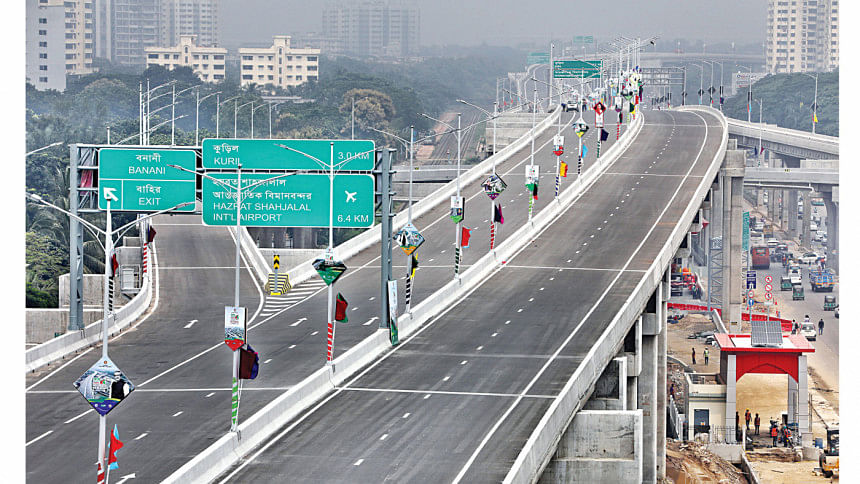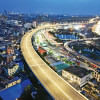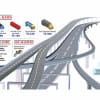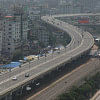Dhaka’s Expressway Dream Comes True

When the World Bank released an analysis of Dhaka city's traffic conditions in 2017, the total number of registered vehicles was 11.82 lakh. In its analysis, the WB stated that the average traffic speed had dropped from 21 km to 7 km per hour, only slightly above the average walking speed. It also pointed out that congestion in Dhaka consumes 3.2 million working hours per day.
Over the last five and a half years, an additional 8.47 lakh registered vehicles have flooded the streets of the capital, not to mention the many unregistered vehicles, making the traffic situation nightmarish. When city dwellers have to spend hours on the streets, they see a ray of hope in the partially open metro rail.
Now, they are about to get a little more relief as the authorities are set to partially open the long-awaited Dhaka Elevated Expressway today. The 11.5km section from the Airport to Farmgate is going to be inaugurated today, serving as an alternative route to and from the airport road, one of the busiest in the city.
Once this section opens, it will take less than 10 minutes to reach Farmgate from the Airport, a journey that would normally take more than one hour on regular roads, officials have stated.
"I think people in Dhaka will be happy to be able to use the expressway for easy traveling. It will be faster," said Bhaskon Khannabha, Managing Director of First Dhaka Elevated Expressway Company Ltd, the private partner of the PPP Project.
In addition to the 11.50km main line, 13 ramps for accessing and exiting the expressway will also be opened to help vehicles avoid traffic-choked crossings and roads, thus bypassing traffic congestion, they said.
Transport experts also believe that the partial opening will benefit some private car users, but people will have to wait until the full 19.73km expressway from the Airport to Kutubkhali on the Dhaka-Chattogram Highway is opened to get its full benefits.
Prof. Hadiuzzaman of BUET's Civil Engineering Department stated that the purpose of the two expressways, including the Dhaka Elevated Expressway, was to create a 'vertical bypass' for vehicles, particularly heavy vehicles, inside Dhaka city.
Another expressway, namely the Dhaka Ashulia Elevated Expressway, will be connected with the Dhaka Elevated Expressway near the airport area after coming from the Dhaka EPZ area via Ashulia and Abdullahpur. The 20km expressway is also under construction with a deadline of June 2026.
"So, people will not fully benefit from the expressway after partially opening one expressway," he told The Daily Star recently. "However, it would provide relief to some private car users because people will be able to avoid two congestion-prone areas—Banani and Farmgate," he added.
He also emphasized that the benefit from the half-way expressway will depend on the proper management of the ramps.
Hadiuzzaman, also the former director of the Accident Research Institute at BUET, said that once the construction of both expressways is fully completed, people will experience the actual benefits of the expressway.
He explained that heavy vehicles, including trucks, which are banned from operating within the city during the daytime, and long-haul buses, will be able to bypass the city using the expressways. When a significant number of vehicles use the expressway, it will reduce the number of vehicles on the existing roads, thereby cutting traffic congestion and creating opportunities for proper public transport facilities, he added.
However, Bhaskon Khannabha said that people will experience the expected benefits even from the partial opening of the expressway.
He also mentioned that the partial opening will help educate the public on how to use the expressway, including lanes and both manual and electronic toll payment systems.
In 2005, the government approved the Strategic Transport Plan (STP) for Dhaka city, which recommended the construction of three metro rail lines, three Bus Rapid Transit (BRT) lines, and the Dhaka Elevated Expressway. However, the STP was revised in 2016.
Following the transport masterplan, the government initiated three major projects: Mass Rapid Transit (metro rail) Line-6, BRT from the Airport to Gazipur, and the Dhaka Elevated Expressway, aiming to reduce traffic congestion in the capital and its adjacent areas.
The government decided to implement the Dhaka Elevated Expressway under the Public-Private Partnership model. This is the first project in the transport sector being implemented under the PPP model with foreign investment.
The expressway's construction was inaugurated twice, first by Prime Minister Sheikh Hasina in April 2011, with completion expected by mid-2014, and once again by Road Transport and Bridges Minister Obaidul Quader in August 2015. However, the formal construction commencement date is January 1, 2020, marking the beginning of the 25-year concession era, including a three-and-a-half-year construction period.
In January 2011, the Bangladesh Bridge Authority (BBA) signed a deal with the Italian-Thai Development Public Company to build the expressway at a cost of Tk 8,703 crore. The deal was later revised and inked again in December 2013, with the cost adjusted to Tk 8,940 crore after several changes were made to the design. The government is set to provide Tk 2,413 crore (27 percent) as viability gap funding, while the private partner will cover the remainder.
Additionally, the government will allocate Tk 4,917.57 crore for land acquisition, resettlement, and relocation of utility service lines, making the total project cost Tk 13,857.57 crore.
However, the project faced multiple setbacks over the years, primarily due to the private investor, Italian-Thai, struggling to secure funds for the project and encountering issues related to land acquisition, according to officials involved in the project.
The financial crisis was eventually resolved when Italian-Thai transferred 49 percent of its shares to two Chinese companies—China Shandong International Economic and Technical Corporation Group (34 percent) and Sino Hydro Corporation Ltd (15 percent) in 2020.
The project authorities revealed that land acquisition, aligning the route, obtaining approvals, relocating utilities, and managing finances with the private partners consumed time and contributed to project delays.
"We had planned and expect to complete the entire project by June next year, provided there are no obstructions. We have successfully overcome all the challenges. Work is progressing for the remaining part of the expressway," stated Bhaskon Khannabha.

 For all latest news, follow The Daily Star's Google News channel.
For all latest news, follow The Daily Star's Google News channel. 







Comments